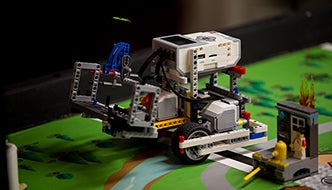Can you think about how and why we use water? Just ask the 12 elementary and middle school teams from the Capital Region that competed in the FIRST LEGO League (FLL) Regional Qualifying Tournament on Dec. 16 at Rensselaer. More than 120 area students worked together to use their imagination and creativity in combination with science, technology, engineering, and math (STEM) to explore and solve a real-world human water cycle problem as their project.
In the 2017-2018 HYDRO DYNAMICSSM Challenge, student teams are challenged to learn about how we find, transport, use, and/or dispose of water, and propose solutions for any issues they identify.
“Fifty percent of all human illness is the result of waterborne pathogens,” said Dean Kamen, founder of FIRST. “If you gave people clean water, you would empty 50 percent of the hospital beds in the world. We can work together to solve the world’s water crisis, and who better to contribute to this work than the young people who will inherit today’s global issues?”
The global FLL competition was brought to the region for the 10th time through a partnership between Rensselaer, Hudson Valley FLL, and NY Tech Valley FIRST sponsors. The program kicked off with the opening ceremonies.
FLL is the middle school component of the FIRST Robotics Competition, an international contest that teams professionals and young people to solve an engineering design problem in a competitive way. Over an eight-week period, teams work to build, test, and program an autonomous robot using a LEGO® MINDSTORMS® set to solve missions on an obstacle course.
During the 2017-2018 competition season, more than 235,000 children ages 9 to 16 from nearly 90 countries will participate in the HYDRO DYNAMICS challenge. During the competition, teams will work to solve a series of water-usage-themed missions as part of the Robot Game. Missions include removal of a broken water pipe, movement of sludge, filtering water, providing water to make flowers grow, putting out a house fire, and more.
“By challenging teams to understand what happens to our water, and how we can improve the ways we use it, we are also asking students to collaborate in ways they might not otherwise find possible during their normal school day,” said Jordan Vener, who serves as program manager for interactive technologies in the Rensselaer Center for Initiatives in Pre-College Education (CIPCE), which works with area teachers and students to promote the use of robotics in the classroom.
“FLL robotics challenges are unique as they call on each team member to apply a range of subject knowledge necessary to solve critical real-world problems,” Vener said. “As teams demonstrate the engineering design process together, they also put their social skills to the test. Everyone involved with all things FIRST understands the critical role that teamwork plays to the success of each team. To encourage this cohesiveness, FLL asks its members to embrace a set of values known as the core values. Each year I enjoy making my way to all three judging areas to witness the various innovative and technological solutions the teams have designed. As if that weren’t enough, the robot competition table showcases each team’s ability to strategize using their coding abilities and robot build designs.”
Participating students hailed from several middle schools and programs, including Averill Park Central School District, Burnt Hills-Ballston Lake, Ravena-Coeymans-Selkirk, the Robert C. Parker School from Wynantskill, N.Y.; Stephen and Harriet Myers Middle School, William S. Hackett Middle School, and the Edmund J. O’Neal MS of Excellence from Albany; Queensbury Union Free School District, and the South Colonie School District.
The tournament was supported by 60 volunteers, including Rensselaer students, faculty, and staff, along with area students from high school robotics teams. The teams of judges and referees are comprised of students from Rensselaer’s Science Ambassadors and Engineering Ambassadors organizations, along with longtime friends of CIPCE and FIRST.
“After eight intense weeks, the competition season culminates in high-energy, sports-like tournaments around the globe,” said Paul Schoch, associate professor in electrical, computer, and systems engineering, and director of CIPCE. “Over the years, it has been amazing to watch the teams of children guided by their volunteer coaches as they demonstrate their problem-solving skills, creative thinking, teamwork, competitive play, sportsmanship, and sense of community. We’re proud to again host this competition because events like this not only help students to bring technology to life through their hands-on participation, but they also allow students to tap into their innate curiosity and appetite for discovery, and can also inspire them to consider future careers as scientists and engineers.”
Read the full release: http://bit.ly/2CDmMXd


